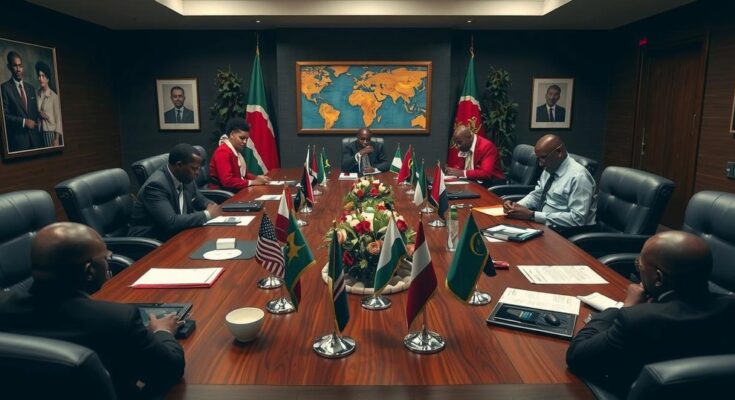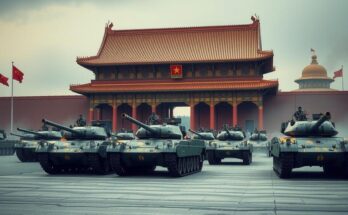South Sudan’s holdout groups, non-signatories to the 2018 peace deal, will resume peace talks in Nairobi following Kenyan President Ruto’s diplomatic efforts. The inclusive Tumaini Initiative aims to engage these groups in forging a sustainable peace framework amid ongoing security concerns. President Ruto emphasized peaceful dialogue as essential for long-term stability in South Sudan, which is crucial for regional economic recovery.
The holdout groups in South Sudan, which did not sign the 2018 peace agreement, have consented to recommence peace discussions in Nairobi. This decision follows prolonged expressions of concern over security issues and dissatisfaction with the previous negotiation process. The announcement was made after a visit from Kenyan President William Ruto to Juba, where he engaged with President Salva Kiir, First Vice President Riek Machar, and other significant stakeholders within the Transitional Government of National Unity (TGoNU). President Ruto stated that the involved parties have resolved to facilitate mediation in Nairobi in order to tackle unresolved matters related to the ongoing South Sudan peace process. In his statement post-visit, he remarked, “It’s encouraging to see that gaps between the government and opposition can be bridged, paving the way for a new era of sustainable peace and prosperity.” Ruto emphasized that lasting peace in South Sudan necessitates inclusive dialogue. The negotiations, known as the Tumaini Initiative, were initiated in May at the request of Kiir for Kenya to host these discussions. The process will now also include the Intergovernmental Authority on Development (Igad), the original mediator of the 2018 peace agreement, formally referred to as the Revitalised Agreement on the Resolution of the Conflict in South Sudan. Kenya’s belief is that Igad’s participation will supply essential regional backing to this renewed initiative, which aims to integrate the non-signatories into the peace accord. The stability and peace of South Sudan are deemed critical for the nation and the wider region’s economic revitalization. State House Nairobi conveyed that the two leaders planned to address a variety of concerns critical to establishing lasting peace through the Tumaini Initiative. The initiative has reportedly developed through extensive dialogues over the past six months, laying groundwork for enduring peace. President Ruto appointed Lieutenant General (Rtd) Lazarus Sumbeiywo and Mohamed Guyo to mediate negotiations between the TGoNU and the holdout factions. Although the Tumaini Initiative had encountered setbacks due to Juba’s withdrawal from discussions, agreement had been reached on six out of nine essential protocols regarding reconciliation, justice, power-sharing, and long-term reconstruction. Three other protocols were noted as being initialed, indicating the conclusion of discussions on them, but not necessarily an agreement on their specifics. This year, President Ruto led a faction of leaders in affirming a commitment to peace, aiming to mitigate violence from both camps. Sumbeiywo previously underscored that a new constitution would play a key role in averting future conflict. Moreover, the coalition government in Juba recently extended its mandate by two years, effective February next year, following the failure to prepare for presidential elections previously set for December this year. Nairobi has reported that many of the initially reluctant holdout groups have begun to embrace the Kenyan-led mediation efforts and have sent observers to participate in the process. Some of these factions are implicated in recurrent attacks on trucks originating from Kenya and Uganda, thus contributing to a wider regional security concern.
The situation in South Sudan remains precarious following the civil conflict that led to significant instability since gaining independence in 2011. Despite the signing of the 2018 peace agreement, several armed groups refused to participate, prolonging the conflict. The involvement of regional powers, such as Kenya under President William Ruto’s leadership, reflects the urgent need for a renewed, inclusive dialogue to address ongoing violence and the humanitarian crisis resulting from the political deadlock. Recent developments indicate that there is a renewed willingness from some factions to engage meaningfully in the negotiation process.
In summary, the agreement by South Sudan’s holdout groups to re-engage in peace talks in Nairobi marks a significant step towards potential stability in the region. With the incorporation of Igad into discussions and the commitment from both the government and opposition toward dialogue, there emerges a renewed hope for sustainable peace. However, the challenges of implementing previous agreements and addressing the underlying causes of conflict remain critical obstacles moving forward.
Original Source: www.theeastafrican.co.ke




